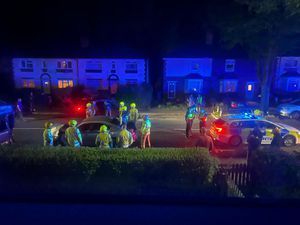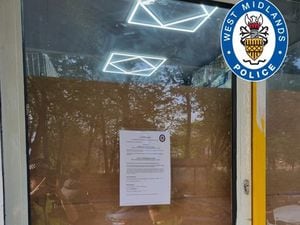Tributes to world-renowned jeweller after death aged 84
One of the last of the old-style ‘jobbing’ jewellers has died at the age of 84.
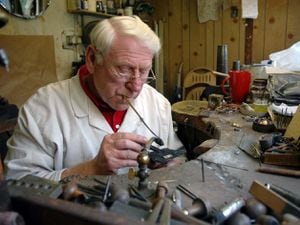
Tom Allcott, who worked in Birmingham’s jewellery quarter for almost seven decades, died suddenly last week.
Mr Allcott, who lived in Tamworth, was known around the world for his skills at repairing and restoring antique jewellery.
His son Kevin said he believed he was the only person left in the country who still practised certain techniques.
“With the way he used to work, with the old blow pipe on the gas tap, I don’t think there was anyone else left in the trade who did that,” he said.
“He tried to get me to use it once, but I couldn’t manage it and regrettably I had to go back to my way of working, with propane gas.”
Kevin, who is 59, said his father was working right up until his death, although last year he was forced to move out of tiny shed at the rear of Spencer Street as part of a redevelopment scheme.
“He moved to a new unit just down the road, but he hated it because there was no window, and he felt isolated,” said Kevin.
“He always said that if he ever retired or could not carry on working, that he would die.”
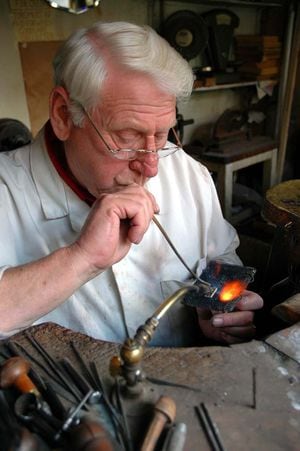
Kevin added that some years ago his father was asked to work at the Black Country Living Museum in Dudley, but turned the opportunity down.
“He said he could not go back to working for someone else, having to be in at a certain time and work a fixed number of hours.”
Mr Allcott was staying with a close friend who he supported as a carer when he died suddenly.
“He had been for his Covid jab on the Monday, and he was as right as rain,” he said.
In his white cow-gown, sitting at his wooden bench covered in tools, Mr Allcott cut a distinctly old-fashioned figure.
In a 2008 interview with the Express & Star, Mr Allcott told how an antique dealer from the United States would regularly visit him at his workshop in Spencer Street.
“He brings stuff over, and he will probably come back three months later and pick it up,” he said at the time.
He also visited China, where he was asked to take specialist items back with him for repair.
Mr Allcott came from a long line of jewellers. His mother and sister both worked in the trade. He also had two cousins who were jewellers, the one having worked on both the Eisteddfod Crown and Warwick Library’s weather vane.
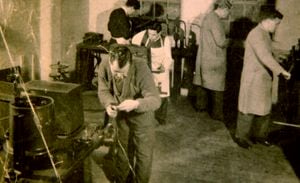
As a child his mother got him a part-time job as a porter in the jewellery trade, when he left school at 15 in 1952 he entered the trade full time.
“I never had an apprenticeship,” he said. “I was sat next to an old fellow and he told me everything he could do.
“A lot of them used to go on day-release courses at a school and learn that way, but that was in the 50s and people knew what they were doing.”
He first worked at W H Wilmott in Albion Street, making watch bracelets and chains for pocket watches, but his career was interrupted for two years when he was called up for his National Service.
“When I came back the old fellow said: ‘I have told you all I know, if you want to improve yourself you should do a couple of years at a different place’, so that’s what I did. I went and worked for Gaunt’s, and then I stayed at Ecclestone and Hart for quite a while.”
He also said the Jewellery Quarter had changed considerably during his 69 years in the trade, with a big expansion in the retail side.
“You have now got people in the trade just selling to the public. At one time nobody could come into a trader and buy stuff, not members of the public. When I started, when I wanted to buy something in the trade, I had to get one of my bosses to write me a letter and take it to the place I was going to buy it off,” he said.
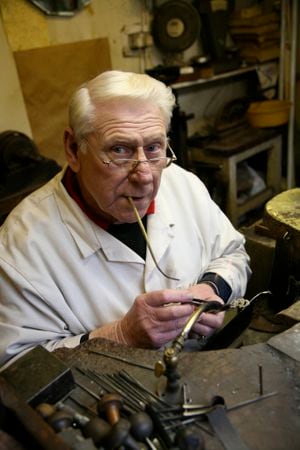
He had voiced concerns that many of the old skills would be lost as the existing jewellers moved towards retirement.
“There aren’t a lot of youngsters coming into it now,” he added.
“There are quite a few youngsters in the universities, but they are just designing outlandish things.
“If you have got something that’s antique Victorian stuff now, they couldn’t do it.”
Today’s throwaway society may also play a role.
“Youngsters are buying stuff from Argos, they keep it a while and then they throw it away.
“I say to them ‘why don’t I melt it down and make you something?’ but they don’t think to do that.”
Kevin said he had followed in his father’s footsteps by working part-time as a jeweller until about 2016, but said he had since retrained and was now working as a dance teacher.
Mr Allcott’s wife Pauline died in 1993. As well as son Kevin, Mr Allcott leaves a grandson Ryan and grand-daughters Lauren and Jade.

